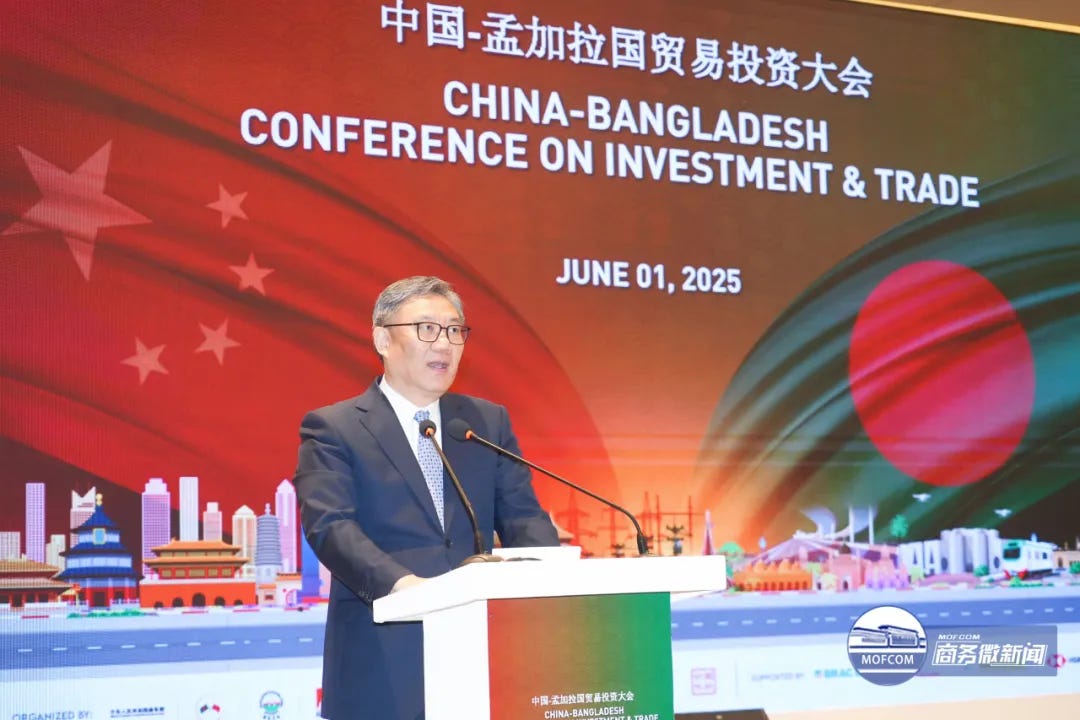China ramps up South Asia trade ties
From mango shipments to ministerial talks, Beijing is dialing up its regional trade game with Sri Lanka and Bangladesh
In today's piece, I’d like to take a closer look at China’s growing economic engagement with South Asia. On the eve of and during the Dragon Boat Festival holiday, China's Commerce Minister Wang Wentao paid back-to-back visits to Sri Lanka and Bangladesh—two of China’s key Belt and Road partners in the region. A WeChat blog of the Ministry of Commerce, “MOFCOM WeChat News” (商务微新闻), has been closely tracking the visit since May 29.
In both countries, Minister Wang repeatedly emphasized the importance of “implementing the consensus reached by the leaders of the two countries,” a phrase that underscores the diplomatic weight behind these economic visits.
Earlier this year, Chinese President Xi Jinping held separate meetings with leaders from Sri Lanka and Bangladesh:
In January, Xi met with Sri Lankan President Anura Kumara Dissanayake in Beijing, where he reaffirmed China’s support for Sri Lanka’s economic development and the deepening of cooperation in key areas such as high-quality Belt and Road projects, modern agriculture, the digital and marine economies.
In March, Xi met with Bangladeshi interim government's Chief Adviser Muhammad Yunus. Xi expressed readiness to expand cooperation in digital infrastructure, green development, marine economy, and water management—while also strengthening people-to-people ties.
Key Meetings in Sri Lanka (May 29–30)
According to the Commerce Ministry, Wang’s schedule in Colombo included:
May 29: Co-chaired the 8th Meeting of the China–Sri Lanka Joint Commission on Economic and Trade Cooperation alongside Sri Lankan Minister of Trade Nalin Fernando.
May 29: Met with President Dissanayake to exchange views on deepening bilateral trade ties.
May 30: Attended the China–Sri Lanka Trade and Investment Forum, joined by over 200 representatives from Chinese and Sri Lankan companies and business associations.
May 30: Held talks with Sri Lankan Prime Minister Dinesh Gunawardena on implementing bilateral consensus and enhancing practical economic cooperation.
Key Engagements in Bangladesh (May 31–June 1)
In Dhaka, Minister Wang’s visit was equally packed:
May 31: Met with Commerce Adviser Sk Bashir Uddin, for in-depth discussions on deepening China–Bangladesh economic ties.
June 1: Attended the China–Bangladesh Trade and Investment Conference, which brought together more than 400 representatives from the business communities of both countries.
June 1: Co-chaired the 15th Meeting of the China–Bangladesh Joint Commission on Economic and Trade Cooperation with Finance Adviser Salehuddin Ahmed, covering a wide range of topics including trade facilitation, industrial and supply chain collaboration, and support for multilateralism.
June 1: Held talks with Bangladeshi interim government's Chief Adviser Muhammad Yunus to explore further practical cooperation.
During the meetings, officials from both Sri Lanka and Bangladesh expressed strong hopes for increased Chinese investment in their countries. Wang, for his part, reiterated China’s readiness to unlock the full potential of bilateral trade, deepen industrial and supply chain integration. To me, it's a positive response to concerns about trade imbalances—an issue that remains sensitive for both countries.
Expert Views: South Asia as a Strategic Market
“Even excluding India, the South Asian region is home to a massive market of around 500 million people,” Lin Minwang, deputy director of the Center for South Asian Studies at Fudan University, told me in an interview. “Many of these countries are also actively seeking stronger supply chain resilience, which makes trade and investment cooperation with China a win-win proposition.”
On the issue of trade deficits, Liu Zongyi, director of the Center for South Asia Studies at the Shanghai Institutes for International Studies, noted that these are primarily structural issues. “China has granted significant tariff exemptions to these countries, with most of their exports entering the Chinese market tariff-free,” he explained.
Liu added that in recent years, China has been relocating certain industries to Belt and Road countries, including those in the Global South. “This helps these countries move beyond being passive participants in global supply chains. It’s also part of China’s strategy to strengthen its external economic circulation and reinforce economic resilience.”
Wang Wentao’s remarks at both bilateral forums echoed these goals. In Bangladesh, he spoke about helping “boost export capacity and promote integrated trade and investment development.” In Sri Lanka, he highlighted the importance of “deeper supply chain integration” and supporting “local industrial development.”
Such initiatives not only aim to address trade imbalances, but also help reinforce a multilateral trade framework that brings greater stability and predictability to the global economy.
China’s media have also reported favorably on the response from local business chambers—another signal that these visits are being viewed as more than symbolic gestures.
China, Sri Lanka sign new cooperation agreements, deepen economic ties -- Global Times
Business representatives echoed the positive tone of official engagements. Huang Fen, vice president of Tongfa Group, a Chinese enterprise engaged in the development, processing and trading of canned food, sugar and other products, went to Colombo to seek opportunities recently. She expressed appreciation for the favorable policies released by the Sri Lanka government to attract foreign enterprises.
......
Sri Lanka is one of the most important participating countries of the BRI and enjoys a traditional friendship with China. “We deeply felt the traditional friendship between China and Sri Lanka during the trip, and thereby are encouraged for future investment and trade cooperation with our partners in Sri Lanka,” Huang added.
A Chinese WeChat blog specializing in South Asian affairs, South Asia Research Bulletin (南亚研究通讯), also reported on the trip under the headline: “Commerce Minister Wang Wentao Leads Delegation to Sri Lanka, Aiming for Deep Integration of Industrial and Supply Chains!”
Ahead of Wang’s visit to Bangladesh, Xinhua News Agency reported that the first consignment of Bangladeshi fresh mangoes was exported to China on May 28.
"In the near future, an increasing number of high-quality Bangladeshi agricultural products will be stocked on the shelves of Chinese supermarkets," said Chinese Ambassador to Bangladesh Yao Wen.






